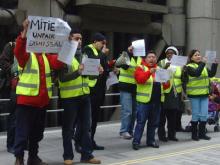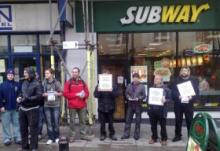On April 4th, several Locals of the Solidarity Federation, alongside other anarchists, trade unionists and activists took part in the national day of action against Subway, in support of victimised pregnant worker Natalia Szymanska. This day saw pickets of Subway stores across Britain and Ireland, demanding her reinstatement and compensation.
19 year old Natalia Szymanska worked at a Belfast branch of Subway. As she was 5 months pregnant and working until 10pm, she arranged for her boyfriend - an employee of the very same company - to pick her up and walk her home. He had done this many times previously, with the full knowledge and agreement of her managers and never before had it been a problem. However, unknown to Natalia her managers had a different plan on this occasion, because a month previously she had informed them she was pregnant - a fact which would require them to provide her paid maternity leave.
Management seized upon the presence of her boyfriend, and Natalia was dismissed in a farce of a disciplinary. Her managers believed she would have no recourse, and be forced to accept their decision. Their excuse was violation of health and safety - allowing an “unauthorised member of staff” onto the premises. Quite why the presence of another employee of the same company represented such a dire threat to health and safety was never explained.
Natalia turned to the Belfast and District Trade Union Council, who for the past several months have been holding a regular series of pickets of the premises in question, supported by a wide array of organisations from the labour movement and beyond. Thus far, G.G. Cuisine, the franchise holder has been unwilling to budge, and so the decision was made to turn up the pressure, and spread the pickets across the whole of Britain and Ireland. The aim is to force Subway to pressure G.G. Cuisine into settling with Natalia and to show that we will not allow bosses to treat any worker with such contempt.
The pickets were well attended across both countries, being hold in a wide range of cities, including London, Brighton, Belfast, Bradford, Manchester, Bristol, Liverpool and Dublin. In Brighton and London pickets were also held at a wide range of different Subway store Since the pickets, the franchise holder has attempted to get an injunction against Belfast TUC in order to stifle the protest, but as we go to press, the struggle for Justice for Natalia continues.

